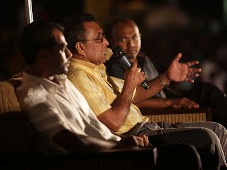With additional reporting by Shafaa Hameed
Former President Mohamed Nasheed’s lawyers today decried the Criminal Court’s continued failure to provide court proceedings into the opposition leader’s terrorism trial, with only two days remaining before the appeal period expires.
The Criminal Court only today released a judgment summary, which lawyers say is not enough to build an appeal.
Without the full transcripts of court proceedings, lawyers would not be able to determine if the three judge panel had considered fully witness testimony and defence arguments in their verdict, a statement issued today said.
Expressing grave concern, Nasheed’s legal team said the Criminal Court’s failure to provide court proceedings “is an obstruction of President Nasheed’s right to appeal.”
The opposition leader was convicted of terrorism and sentenced to 13 years in jail on March 13. According to new rules enacted prior to Nasheed’s trial, lawyers have 10 days to file their appeal.
A signed copy of the judgment summary was provided just before 3:00pm today, although the Supreme Court issued rules require judges to provide the summary at the end of the trial.
The appeal deadline is believed to expire on Sunday, March 22.
Asked if the ten-day appeal period included weekends, a Criminal Court spokesperson said he would have to check the new rules.
“These are untested rules. So we will file the appeal by Sunday, March 22,” Ahmed said.
The conviction of the opposition leader on terrorism charges relates to the military detention of Criminal Court Chief Judge Abdulla Mohamed in January 2012.
Nasheed’s Maldivian Democratic Party (MDP) has previously accused the Criminal Court of “deliberately refusing to release court proceedings in order to frustrate attempts at launching an appeal.”
The UN High Commissioner for Human Rights Zeid Ra’ad Al Hussein on Wednesday called on the Maldives to enable international jurists to observe an appeal after “a hasty and apparently unfair trial.”
Expressing strong concern, Zeid noted that the Criminal Court refused to provide Nasheed adequate time to prepare a defence, and said the court’s decision not to call defence witnesses was “contrary to international fair trial standards.”
He urged the former president be given adequate time to prepare and present his defence during the appeal process.
“The Nasheed case places the Maldives judicial processes in a sharp spotlight. The flagrant irregularities in this case can still be rectified in the appeal process, and I urge the authorities to restore domestic and international confidence in the legal system by enabling international jurists to observe the appeal process,” he said.
The surprise trial began one day after Nasheed was arrested on February 22, and was completed after 11 hearings in 19 days.
“It is hard to see how such hasty proceedings, which are far from the norm in the Maldives, can be compatible with the authorities’ obligations under international law to conduct a fair trial,” the UN human rights chief said.
President Abdulla Yameen meanwhile called on all parties to respect the Criminal Court’s verdict.
In a statement released by the President’s Office on Sunday (March 15), President Yameen noted that the opposition leader has “a constitutionally guaranteed right of appeal” to challenge his conviction on terrorism charges at the High Court.
Correction: This article previously stated the Criminal Court had issued court proceedings. This is incorrect. The court had only provided a judgment summary.
Related to this story:
UN human rights chief expresses strong concern over “hasty and apparently unfair” Nasheed trial
Former President Nasheed found guilty of terrorism, sentenced to 13 years in prison
US, EU, and UK concerned over lack of due process in Nasheed trial
Respect Criminal Court verdict, says President Yameen
“This is not a court of law. This is injustice,” Nasheed tells the Criminal Court
Judge Abdulla suspected of involvement in “contract killing,” says Nasheed
